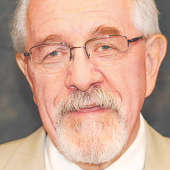- Christmas shopping is done, presents wrapped, strings attached? (12/14/16)
- Cecil is dead and human lives are threatened every day (8/12/15)
- As state flags go, Nebraska's ranks 50th (7/8/15)
- When everything looks like a nail (4/29/15)
- Who remembers to coal slurry pipeline debate? (3/11/15)
- More revelations in Department of Corrections mess (12/17/14)
- The Legislature becomes more Republican (11/19/14)
Opinion
Turnback tax in the news again
Wednesday, October 24, 2012
City fathers in Lincoln hope to use some state sales tax proceeds to help pay off the Pinnacle Bank Arena that is being built in the historic Haymarket area downtown.
Under provisions of the Nebraska Convention Center Facility Financing Assistance Act, a state panel will be asked to allow the city to use 70 percent of the state sales tax from the arena and surrounding hotels for up to 25 years. The measure will likely be approved because the precedent has been set more than a decade ago by allowing the arena then known as the Qwest Center to use a similar financing arrangement. And a couple years ago, lawmakers changed the wording of the act to allow Ralston to construct and begin to pay for an indoor ice rink that is also used for other events.
The Convention Center Facility Financing Assistance Act provides a mechanism for using sales tax revenue to fund the construction or enhancement of certain facilities. Sales tax revenue generated by a qualifying facility -- and by retailers within a specified vicinity -- is "turned back" to assist in paying down the debt incurred to develop and build the facility.
Retailers located within 600 yards of an eligible facility will be subject to the turnback formula. Any increase in sales tax revenue from retailers that existed 24 months prior to the facility's completion and all sales tax revenue collected by retailers that began operation up to 24 months prior to, or 24 months after completion of the facility, can be used for the turnback provision.
So why should folks in Greater Nebraska care? The Local, Civic, Cultural and Convention Center Funding Act was offered by state senators from Omaha as a perk to rural lawmakers to get them to support construction of the facility in Nebraska's largest city. The remaining 30 percent of the funds are earmarked for statewide projects ranging from a meeting hall and library in Tobias (in southeast Nebraska), to improvements to the Community Hall in Miller (in Central Nebraska) and a new community center in Arnold (in Nebraska's Sand Hills). The leftover 30 percent from Lincoln will also go into the pool of statewide funds.
More than 30 projects, including improvements to the Gering Civic Center (in Nebraska's Panhandle), have been funded since 2004 from that 30 percent cut from funds generated by the Qwest (now Century Link) Center and the nearby hotels. With that facility paid off, the 70 percent share in Omaha is used for other Omaha projects with a stipulation that at least 10 percent go for programs or facilities in high poverty and high crime rate areas of the city.
State Sen. Brad Ashford of Omaha helped fashion the original turnback tax law a decade ago after visiting communities across the state. He noted that people had pride in their towns and their community buildings, but improvements were too expensive. He said the initial idea always was to include assisting other Nebraska towns with their community centers along with helping the Qwest Center pay its debts.
Ashford says it means a lot that his colleagues in the Legislature from Omaha and the rest of the state are tied together through this 30 percent fund. He says it was a real effort to capture the spirit of what made Nebraska "Nebraska."
The state Department of Revenue says that in Omaha, the turnback tax generates about $3 million a year; in Lincoln it's expected to bring in about $1.5 million annually, which would be used to make payments on about $24 million in debt issued by the city. Omaha voters approved a $198 million bond to build the Qwest Center.
The turnback grants recently funded 25 smaller projects in Omaha that would either showcase important historical aspects of those areas, or assist with the reduction of street or gang violence in the target area. When the Lincoln arena is paid for, it's assumed that the funds will be used for similar purposes in the Capital City.
Since 2004, when the Heartland Events Center in Grand Island was the first recipient of turnback tax funds, the following communities have also benefitted: Kimball, Hastings, Arnold, Miller, Stuart, David City, Maywood, Gering, Humphrey, Papillion, South Sioux City, Atkinson, Creston, Bancroft, Firth, Kennard, Randolph, Tobias, Tekamah, Brownville, Cairo, Fremont, Odell, Beaver City, Blue Hill, Dannebrog and Stapleton.
In good times and bad, these mini-Qwest Centers help attract people to communities and enhance the local quality of life. After 9/11, people were sticking closer together and rallying around the things they had. That's why these community buildings are so important. It's the benefit soup supper, the Christmas program, the wedding reception -- the very real pieces of our lives.

